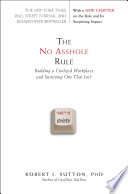

In 'The No Asshole Rule', Robert Sutton presents a compelling argument for the necessity of maintaining a respectful and collaborative workplace. The book's central premise is that toxic individuals—defined as 'assholes'...
Continue readingIn 'The No Asshole Rule', Robert Sutton defines an asshole as someone who consistently puts others down, belittles them, or treats them with contempt. This behavior can manifest in various ways, such as demeaning comment...
Continue readingSutton discusses the significant costs associated with tolerating assholes in the workplace. These costs are not merely emotional but also tangible, affecting productivity, employee satisfaction, and even financial perfo...
Continue readingOne of the core messages of Sutton's book is the necessity of implementing a 'No Asshole Policy' within organizations. This policy should not only be about firing toxic individuals but also about creating a culture that ...
Continue readingLeadership plays a critical role in managing and mitigating toxic behavior within organizations. Sutton emphasizes that leaders must model the behavior they wish to see and actively address any signs of toxicity. This in...
Continue readingSutton argues that building a positive workplace culture is essential for preventing the rise of assholes in organizations. This culture should emphasize respect, collaboration, and support among employees. Sutton sugges...
Continue readingImplementing a No Asshole Rule can lead to long-term benefits for organizations, including improved employee retention, higher job satisfaction, and greater overall productivity. Sutton illustrates how organizations that...
Continue readingSutton emphasizes the importance of personal responsibility and self-reflection in combating toxic behavior. Individuals must recognize their own potential for asshole behavior and take steps to address it. This includes...
Continue readingThe reading time for The No Asshole Rule depends on the reader's pace. However, this concise book summary covers the 7 key ideas from The No Asshole Rule, allowing you to quickly understand the main concepts, insights, and practical applications in around 24 min.
The No Asshole Rule is definitely worth reading. The book covers essential topics including The Definition of an Asshole, The Cost of Tolerating Assholes, The Importance of a No Asshole Policy, providing practical insights and actionable advice. Whether you read the full book or our concise summary, The No Asshole Rule delivers valuable knowledge that can help you improve your understanding and apply these concepts in your personal or professional life.
The No Asshole Rule was written by Robert I. Sutton.
If you enjoyed The No Asshole Rule by Robert I. Sutton and want to explore similar topics or deepen your understanding, we highly recommend these related book summaries:
These books cover related themes, complementary concepts, and will help you build upon the knowledge gained from The No Asshole Rule. Each of these summaries provides concise insights that can further enhance your understanding and practical application of the ideas presented in The No Asshole Rule.